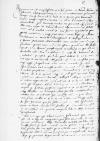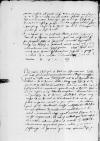Accepi XXIII Decembris ⌊⌋ Dominationis Vestrae Reverendissimae per dominum ⌊Kostka⌋ mihi missas, datas ex ⌊arce Loviciensi⌋ ultima Novembris, quae duriores contra me fuerunt, quam summa illa mea erga Dominationem Vestram Reverendissimam observantia et fides mea, iam a multis annis Dominationi Vestrae Reverendissimae cognita et perspecta, meretur. Neque sine admiratione legi, quod ad traductionem a veritate alienissimam domini ⌊Kostczae⌋ induci Dominatio Vestra Reverendissima potuerit ad eum modum tam acriter mecum expostulare, quasi vero iam talis essem, qualem me ille falso apud Dominationem Vestram Reverendissimam perstrinxit. Commodum se eo tempore ad me contulerant ⌊domini consiliarii serenissimae maiestatis regiae terrarum et civitatum Prussiae⌋, quibus, cum litterae Dominationis Vestrae Reverendissimae eos etiam de iuramento attigerant, illas in consilio perlegi iussi, stupebant una mecum omnes, quod adeo affirmative nos iurasse contra iuramentum serenissimae maiestatis regiae a nobis praestitum expresserit, quemadmodum hoc ex eorum litteris ad Dominationem Vestram Reverendissimam atque etiam ab ipso generoso domino ⌊castellano Gdanensi⌋ latius intelleget, ad quae me refero et ob id in respondendo eisdem ad me Dominationis Vestrae Reverendissimae litteris nolo esse longior. Hoc dumtaxat unum addendum censui, quod, quantum possum, impensius Dominationem Vestram Reverendissimam et oro atque obtestor, ne deinceps adeo facilis ad credendum contra me et ordines hic ⌊consilii⌋ nostri, in quo boni viri sunt multi et Dominationis Vestrae Reverendissimae observandissimi, esse velit. De hoc ⌊homine⌋, qui sic fidei et honori nostro insidiatur, Deus viderit, iustus enim iudex est. Cui etiam causam hanc nostram et aequitati incomparabili ⌊serenissimae maiestatis regiae⌋ commisimus. Quod autem ego esse debeam tantus ⌊Polonorum⌋ osor, non est Dominationi Vestrae Reverendissimae incognitum, quae me superinscribed⌈meme superinscribed⌉ fere educavit et non pauca in ⌊curia⌋ ⌊maiestatis regiae⌋ mihi credidit, credita etiam mihi sunt per hos annos multo plura, in quibus Deo gratia sic me gessi, quod in reditu meo serenissima regia et ⌊reginalis maiesta(te)s⌋ mihi ore proprio gratias agebant, tantum abest, quod proceres ⌊Regni⌋ contra me commoveri et murmurare  BCz, 244, p. 6 merito possint, ad quod numquam daturus sum occasionem, quod Dominatio Vestra Reverendissima
cf. Pl. Capt. 644; Apul. Met. IX 41.21 ⌊certo certiuscf. Pl. Capt. 644; Apul. Met. IX 41.21 ⌋ credat. Facile est calumniari, sed calumniatori dicere hoc, quod verum est, difficile est. Veritas enim affligi potest a malis, opprimi non potest cognoscetque aliquando Dominatio Vestra Reverendissima ⌊hominem illum⌋, opera eius, qualis est, contestabuntur. Quod reliquum est, in pristinam illam gratiam et favorem me Dominationi Vestrae Reverendissimae commendo, quae me numquam alium, quam ut fui semper fidei et honoris amantem, cognoscet meque ut ⌊dominus et patronus meus⌋ colendissimus solita benevolentia sua prosequetur. ⌊Christus Iesus⌋, Dominus noster, eandem Dominationem Vestram Reverendissimam quam diutissime sospitet et prosperet in omnibus.
BCz, 244, p. 6 merito possint, ad quod numquam daturus sum occasionem, quod Dominatio Vestra Reverendissima
cf. Pl. Capt. 644; Apul. Met. IX 41.21 ⌊certo certiuscf. Pl. Capt. 644; Apul. Met. IX 41.21 ⌋ credat. Facile est calumniari, sed calumniatori dicere hoc, quod verum est, difficile est. Veritas enim affligi potest a malis, opprimi non potest cognoscetque aliquando Dominatio Vestra Reverendissima ⌊hominem illum⌋, opera eius, qualis est, contestabuntur. Quod reliquum est, in pristinam illam gratiam et favorem me Dominationi Vestrae Reverendissimae commendo, quae me numquam alium, quam ut fui semper fidei et honoris amantem, cognoscet meque ut ⌊dominus et patronus meus⌋ colendissimus solita benevolentia sua prosequetur. ⌊Christus Iesus⌋, Dominus noster, eandem Dominationem Vestram Reverendissimam quam diutissime sospitet et prosperet in omnibus.
 BCz, 244, p. 6 merito possint, ad quod numquam daturus sum occasionem, quod Dominatio Vestra Reverendissima
cf. Pl. Capt. 644; Apul. Met. IX 41.21 ⌊certo certiuscf. Pl. Capt. 644; Apul. Met. IX 41.21 ⌋ credat. Facile est calumniari, sed calumniatori dicere hoc, quod verum est, difficile est. Veritas enim affligi potest a malis, opprimi non potest cognoscetque aliquando Dominatio Vestra Reverendissima
BCz, 244, p. 6 merito possint, ad quod numquam daturus sum occasionem, quod Dominatio Vestra Reverendissima
cf. Pl. Capt. 644; Apul. Met. IX 41.21 ⌊certo certiuscf. Pl. Capt. 644; Apul. Met. IX 41.21 ⌋ credat. Facile est calumniari, sed calumniatori dicere hoc, quod verum est, difficile est. Veritas enim affligi potest a malis, opprimi non potest cognoscetque aliquando Dominatio Vestra Reverendissima 
